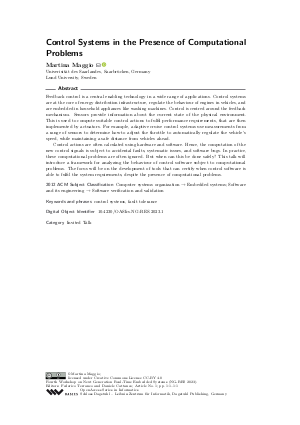Control Systems in the Presence of Computational Problems (Invited Talk)
Author
Martina Maggio 
-
Part of:
Volume:
Fourth Workshop on Next Generation Real-Time Embedded Systems (NG-RES 2023)
Part of: Series: Open Access Series in Informatics (OASIcs)
Part of: Conference: Workshop on Next Generation Real-Time Embedded Systems (NG-RES) - License:
 Creative Commons Attribution 4.0 International license
Creative Commons Attribution 4.0 International license
- Publication Date: 2023-03-16
File

PDF
OASIcs.NG-RES.2023.1.pdf
- Filesize: 256 kB
- 1 pages
Document Identifiers
Subject Classification
ACM Subject Classification
- Computer systems organization → Embedded systems
- Software and its engineering → Software verification and validation
Keywords
- control systems
- fault tolerance
Metrics
- Access Statistics
-
Total Accesses (updated on a weekly basis)
0Document
0Metadata
Abstract
Feedback control is a central enabling technology in a wide range of applications. Control systems are at the core of energy distribution infrastructure, regulate the behaviour of engines in vehicles, and are embedded in household appliances like washing machines. Control is centred around the feedback mechanism. Sensors provide information about the current state of the physical environment. This is used to compute suitable control actions to fulfil performance requirements, that are then implemented by actuators. For example, adaptive cruise control systems use measurements from a range of sensors to determine how to adjust the throttle to automatically regulate the vehicle’s speed, while maintaining a safe distance from vehicles ahead. Control actions are often calculated using hardware and software. Hence, the computation of the new control signals is subject to accidental faults, systematic issues, and software bugs. In practice, these computational problems are often ignored. But when can this be done safely? This talk will introduce a framework for analyzing the behaviour of control software subject to computational problems. The focus will be on the development of tools that can certify when control software is able to fulfil the system requirements, despite the presence of computational problems.
Cite As Get BibTex
Martina Maggio. Control Systems in the Presence of Computational Problems (Invited Talk). In Fourth Workshop on Next Generation Real-Time Embedded Systems (NG-RES 2023). Open Access Series in Informatics (OASIcs), Volume 108, p. 1:1, Schloss Dagstuhl – Leibniz-Zentrum für Informatik (2023)
https://doi.org/10.4230/OASIcs.NG-RES.2023.1
BibTex
@InProceedings{maggio:OASIcs.NG-RES.2023.1,
author = {Maggio, Martina},
title = {{Control Systems in the Presence of Computational Problems}},
booktitle = {Fourth Workshop on Next Generation Real-Time Embedded Systems (NG-RES 2023)},
pages = {1:1--1:1},
series = {Open Access Series in Informatics (OASIcs)},
ISBN = {978-3-95977-268-6},
ISSN = {2190-6807},
year = {2023},
volume = {108},
editor = {Terraneo, Federico and Cattaneo, Daniele},
publisher = {Schloss Dagstuhl -- Leibniz-Zentrum f{\"u}r Informatik},
address = {Dagstuhl, Germany},
URL = {https://drops.dagstuhl.de/entities/document/10.4230/OASIcs.NG-RES.2023.1},
URN = {urn:nbn:de:0030-drops-177320},
doi = {10.4230/OASIcs.NG-RES.2023.1},
annote = {Keywords: control systems, fault tolerance}
}
